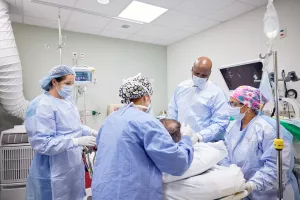Colon and rectal conditions can range from minor irritations like hemorrhoids to serious diseases like colon cancer. Regardless of your minor or major symptoms, our compassionate surgeons treat you with dignity and use state-of-the-art surgical techniques to preserve your quality of life.
Colon and rectal problems can be a real pain
We tend to avoid thinking about having colon or rectal problems. It's understandable, but there's no need to be ashamed. Your colon and rectum are part of your digestive system and like any other part of your body, it needs to be healthy to function properly.

Conditions
If you're struggling with colon or rectal health concerns that may require surgical intervention, know that we are here to offer our expertise. We understand the challenges that come with conditions affecting the colon and rectum, and we are well-equipped to identify and treat them with compassion and care. You can trust us to provide the support and guidance to help you manage conditions such as:
Testing
The symptoms of colon and rectal diseases can be confusing, and getting the right diagnosis is the first step to improving your health. Early detection is important - we provide a variety of screenings and tests to determine the best course of treatment.
Screenings and tests include:
A colonoscopy is a screening exam where your doctor looks at the inside of your colon for polyps - growths on the inner lining of your colon - that could become cancerous if left untreated. Colonoscopies are the most important way to detect and prevent colon cancer.
Due to the rise in colon cancer in people under 50, colonoscopies are now recommended for people starting at age 45. You may need to be tested earlier if you have a family history of IBS, colorectal cancer, colorectal polyps or certain genetic syndromes.
You should talk to your doctor about when you should be screened. The exam is painless and most patients can go home the same day.
A proctology exam is performed during an office visit to check for issues such as hemorrhoids, polyps, fistulas and fissures. It is a minor test that takes only a few minutes.
A transit time study is a simple test that is done at home to time how long it takes for food to pass through your digestive system. Your doctor will ask you to swallow small pills that contain tiny markers. After you have taken all of the medication, an X-ray is taken that counts how long it took for the markers to travel to your colon.
Treatments
It's good to know that not all colon and rectal problems require surgery. Some lifestyle changes or minor procedures can help ease the most common symptoms. But if surgery is needed, we're here to help. We use advanced surgical techniques that result in fewer complications and faster recovery times.
Our specialties include:
- Anorectal surgery
- Colon + rectal cancer surgery
- Pelvic floor program
- Chron's disease + ulcerative colitis surgery
- Physiological + function colon and rectal disorders
Your surgeon will discuss your surgical options and recommend the procedure that will provide the best result. Surgical procedures include:
Laparotomy is open abdominal surgery to examine and diagnose conditions affecting the abdomen. Surgeons may treat issues discovered during surgery or recommend additional treatment.
Minimally invasive surgery procedures use smaller incisions that reduce complications and shorten recovery time. Our surgeries include laparoscopy, robotic surgery and Transanal Endoscopic Microsurgery (TEM).
We use minimally invasive techniques using small incisions that result in the least discomfort and fewer complications.
- Laparoscopic surgery is often used for patients with Crohn’s disease, diverticulitis, polyps, rectal prolapse, ulcerative colitis and some colon and rectal cancers.
- Robotic surgery is an option if you need part of your colon removed.
Transanal Endoscopic Microsurgery (TEM) is a safe procedure for treating rectal polyps, noncancerous tumors and early-stage cancers. The low-risk surgery has a quick recovery time, allowing you to return to your normal activities faster.

From regular office visits to inpatient stays, find the healthcare you need and deserve close to home.

Meet the doctors and care team devoted to supporting you every step of the way along your path to better health.